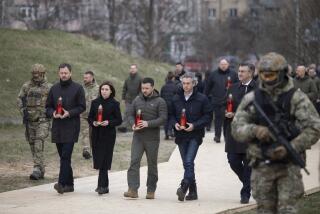Inquiry sought on fate of Serbs
- Share via
ROME — A leading human rights group on Monday urged the governments of Albania and the self-declared state of Kosovo to investigate horrific allegations about the kidnapping and abuse of Serb civilians after the NATO-led war that drove Serbian forces from Kosovo.
The allegations involve about 400 Serbs who went missing after the war, which ended in June 1999. At that time, Kosovo Albanians were gaining power, backed by the United Nations and the U.S.
Human Rights Watch, in calling for an investigation, cited new information, some of it contained in a controversial book written and released last month by the former lead war crimes prosecutor for the Balkans, Carla Del Ponte.
According to Del Ponte and other accounts presented to the war crimes tribunal at The Hague, several hundred Serbs were abducted in Kosovo and transported across the province’s southern border to Albania. Some were beaten. Their fates have remained undetermined and many are thought to have been killed.
In letters sent April 4 to the governments of Albania and Kosovo, Human Rights Watch said Del Ponte presented “circumstantial evidence . . . sufficiently grave to warrant further investigation.”
As of Monday, neither Kosovo Prime Minister Hashim Thaci nor Albanian Prime Minister Sali Berisha had responded, said Fred Abrahams, a senior Balkans investigator for the New York-based human rights watchdog, as the group made its appeal public.
Among the most incendiary of the allegations contained in Del Ponte’s book, published in Italian and titled “The Hunt: War Criminals and Me,” is the claim that doctors removed the internal organs of some of the captives after they were transported to Albania. The organs were then shipped abroad, she asserted.
Abrahams said information on organ trafficking “is suggestive but far from complete.”
He recounted a 2004 inquiry conducted by tribunal officials and a team from the United Nations at a house in Albania that Del Ponte’s informants had identified as the site of the organ removals. The investigation found traces of blood and syringes, drip bags and other equipment used in surgery.
But officials did not deem that evidence to be conclusive. The International Criminal Tribunal for the Former Yugoslavia, which is the formal name of the court at The Hague, said last month amid the furor over the Del Ponte book that the court did not have sufficient evidence to substantiate the organ-trafficking allegations.
Albanian and Kosovo officials, while not responding to Monday’s statement by the rights group, have previously blasted Del Ponte’s allegations as libelous and unfounded. The Serbian government, by contrast, has sought to launch its own investigation.
Abrahams stressed that the disappearances remained the most pressing issue. An estimated 1,500 ethnic Albanians and more than 500 Serbs remain missing from the war; most of the Serbs disappeared after the fighting ended.
--
More to Read
Sign up for Essential California
The most important California stories and recommendations in your inbox every morning.
You may occasionally receive promotional content from the Los Angeles Times.











